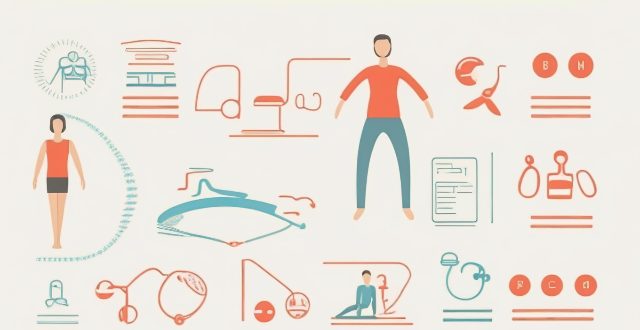Exercise Individual

Is there a difference in mental health benefits between individual and group exercises ?
Exercise plays a vital role in maintaining good mental health, with both individual and group exercises offering unique benefits. Individual exercises provide flexibility, focus, and personal challenge, while group exercises offer social support, motivation, and accountability. Both types of exercise have been shown to reduce stress, anxiety, and depression while improving mood, self-esteem, and cognitive function. Ultimately, finding an activity that you enjoy and can consistently incorporate into your lifestyle is key to maintaining good mental health through exercise.

How does exercise physiology explain the differences in fitness levels among individuals with different genetic backgrounds ?
Exercise physiology explores the interaction between genetic factors and environmental influences like exercise, nutrition, and sleep to explain variations in fitness levels among individuals. It examines how muscle fiber composition, cardiovascular efficiency, metabolic rate, and body composition affect one's ability to perform physical activities. While genetic background sets a baseline for fitness potential, lifestyle choices significantly impact an individual's actual fitness outcomes. By understanding these principles, individuals can optimize their fitness through targeted exercise training, proper nutrition, and adequate rest.

Can exercise help manage symptoms of ADHD ?
Exercise can be a powerful tool in managing symptoms of ADHD by improving focus, reducing impulsivity, increasing energy levels, and promoting better sleep. Choosing the right type of exercise, setting realistic goals, and creating a consistent routine are essential for reaping the full benefits of physical activity for ADHD management.

How does age affect heart rate during exercise ?
Age affects heart rate during exercise by altering the structure and function of the aging heart, reducing maximum heart rate, shifting autonomic regulation towards sympathetic dominance, and decreasing cardiac reserve. Older individuals can still improve their cardiovascular fitness through regular exercise and lifestyle modifications.

How much exercise is needed to see emotional benefits ?
Engaging in regular physical activity is not only beneficial for your physical health but also for your emotional well-being. The question of how much exercise is needed to see emotional benefits is a common one, and the answer may vary depending on individual factors such as age, fitness level, and personal goals. However, there are some general guidelines that can help you determine the amount of exercise needed to experience emotional benefits. There are various types of exercise that you can incorporate into your routine, including aerobic exercise, strength training, flexibility exercises, and balance exercises. Regular exercise has been shown to have numerous emotional benefits, including reduced stress and anxiety, improved mood, better sleep, and increased self-esteem. According to the American Heart Association, the following guidelines are recommended for adults to achieve significant health benefits: - At least 150 minutes per week of moderate-intensity aerobic activity or 75 minutes per week of vigorous-intensity aerobic activity. - At least two days per week of strength training exercises involving all major muscle groups. - At least two to three days per week of flexibility exercises to maintain range of motion and prevent injury. - As needed, particularly for older adults or those with balance issues. It's important to note that individual needs may vary, and it's essential to listen to your body and adjust your exercise routine accordingly to ensure you're getting the most out of your workouts.

Can exercise reverse heart disease ?
Heart disease is a major cause of death worldwide, and it can be devastating to those affected. While there are many treatments available for heart disease, including medication and surgery, some people wonder if exercise can reverse the damage caused by heart disease. There is evidence that regular exercise can help prevent and manage heart disease by improving cardiovascular health, managing weight, lowering blood pressure, improving cholesterol levels, and reducing stress. However, there is no conclusive evidence that exercise can completely reverse heart disease. Despite this, there are still many benefits to regular exercise for heart health. If you have been diagnosed with heart disease or are at high risk for developing it, talk to your doctor about starting an exercise program. They can help you create an exercise plan that is safe and effective for your individual needs and goals.

How do celebrities balance their busy schedules with regular exercise sessions ?
Celebrities balance their busy schedules with regular exercise sessions by prioritizing exercise, planning ahead, hiring personal trainers, incorporating exercise into daily routines, and making time for recovery. By following these tips, anyone can find ways to fit exercise into their busy lives and maintain good health and fitness.

How much exercise is needed to reduce anxiety and depression symptoms ?
Exercise has been shown to reduce anxiety and depression symptoms, with moderate-intensity aerobic exercise for at least 150 minutes per week being effective. However, individual factors such as age, gender, health condition, and lifestyle can affect the amount of exercise needed. It is important to choose enjoyable and sustainable activities for long-term use, and seek professional help if struggling with mental health issues.

Can exercise boost the immune system ?
Exercise can indeed boost the immune system through various mechanisms, including enhanced circulation, reduced inflammation, weight management, stress reduction, improved sleep, increased self-esteem and mental health, microbiome diversity, temperature regulation, prevention of chronic diseases, and social interaction. Regular moderate exercise is generally considered beneficial for the immune system, but it's essential to consult with healthcare professionals to determine the appropriate amount and intensity of exercise for individual needs and circumstances.

Can music help reduce perceived exertion during exercise ?
Music can help reduce perceived exertion during exercise by positively influencing mood and cognition, and acting as a distraction from bodily symptoms associated with fatigue. Numerous studies have shown the benefits of music on perceived effort levels during workouts, but individual preferences and contextual factors play significant roles. To potentially benefit from reduced perceived exertion, it's important to select music that resonates personally and matches the intensity of your workout.

Can people with osteoporosis still do exercise safely ?
Osteoporosis is a condition characterized by low bone mass and deterioration of bone tissue, leading to brittle bones that are prone to fractures. It is a common concern among older adults, especially women. While exercise is generally recommended for maintaining overall health, it is important to consider the safety of physical activity for individuals with osteoporosis. In this article, we will explore whether people with osteoporosis can still do exercise safely and what precautions should be taken. Is Exercise Safe for People with Osteoporosis? Benefits of Exercise for Osteoporosis: - Improved Bone Density: Regular weight-bearing exercises can help improve bone density in individuals with osteoporosis. - Increased Strength and Balance: Resistance training and balance exercises can enhance muscle strength and reduce the risk of falls. - Better Quality of Life: Engaging in physical activities can improve mood, reduce pain, and enhance overall well-being. Risks Associated with Exercise for Osteoporosis: - Fracture Risk: High-impact activities or excessive force during exercise may increase the risk of fractures in people with osteoporosis. - Joint Stress: Some exercises may put excessive stress on joints, potentially leading to joint pain or damage. Safe Exercises for People with Osteoporosis: Weight-Bearing Exercises: - Walking: A low-impact activity that can help maintain bone density. - Dancing: A fun way to engage in weight-bearing exercise while also improving balance. Resistance Training: - Light Weight Lifting: Using light weights or resistance bands can strengthen muscles without putting too much strain on bones. - Bodyweight Exercises: Squats, lunges, and step-ups can be modified to suit individual abilities and provide resistance training benefits. Flexibility and Balance Exercises: - Tai Chi: A gentle form of exercise that focuses on slow, flowing movements to improve balance and flexibility. - Yoga: Certain yoga poses can help enhance flexibility, balance, and strength, but it is essential to avoid high-impact or bending poses that may increase fracture risk. Precautions to Take During Exercise: 1. Consult with a Healthcare Professional: Before starting any exercise program, it is crucial to consult with a healthcare professional who can assess your individual needs and risks. 2. Start Slowly: Begin with low-intensity exercises and gradually increase the duration and intensity as your body adapts. 3. Use Proper Technique: Ensure proper alignment and technique during exercises to minimize the risk of injury. 4. Wear Appropriate Footwear: Choose shoes with good support and cushioning to reduce the impact on joints and bones. 5. Avoid High-Impact Activities: Steer clear of activities like jumping or running that may increase the risk of fractures. 6. Listen to Your Body: If you experience pain or discomfort during exercise, stop immediately and seek advice from a healthcare professional. 7. Incorporate Rest Days: Allow your body time to recover between exercise sessions by including rest days in your routine.

Are certain durations or intensities of exercise more beneficial for cognition than others ?
Exercise has been shown to improve cognitive function, memory, and mental health. Both short-term and long-term exercise can enhance different aspects of cognition. Moderate-intensity exercise is most beneficial for older adults, while high-intensity exercise may also be advantageous but should not exceed certain levels. Aerobic exercise, resistance training, and balance exercises all contribute to cognitive improvement. Individual differences should be considered when determining the optimal exercise regimen for cognitive enhancement.

Does exercise have a greater impact on mental health than meditation ?
Exercise and meditation are both beneficial for mental health, but it is difficult to determine which has a greater impact. Exercise can reduce stress and anxiety, improve self-esteem and cognitive function, and promote better sleep. Meditation can also reduce stress and anxiety, improve emotional regulation and self-awareness, and promote positive thinking. The effectiveness of each practice may vary depending on individual preferences and circumstances. It is important to choose a practice that suits your needs and engage in it regularly for optimal results.

Is it better to do aerobic exercise in the morning or evening ?
The best time to do aerobic exercise depends on your personal preferences, schedule, and individual needs. Morning exercise can boost metabolism, improve mental clarity, and increase energy levels, but it may also be challenging to wake up early enough and could lead to lower performance and joint stiffness. Evening exercise can reduce stress, improve flexibility, and promote relaxation, but it may interfere with sleep, have time constraints, and cause fatigue. It's essential to listen to your body and choose a time that works best for you while maintaining consistency in your fitness routine.

How much exercise is needed to see mental health benefits ?
Regular physical activity is known to improve mental health, but the amount of exercise needed varies based on individual factors. The WHO recommends at least 150 minutes of moderate-intensity aerobic activity and muscle-strengthening activities twice a week for adults. Even small amounts of light activity can have mental health benefits, with moderate-intensity activities like brisk walking improving outcomes significantly. Consistency is key, and personalizing your exercise routine based on preferences and capabilities is essential.

How much exercise is needed per week to prevent chronic disease ?
Chronic diseases are a major cause of death and disability worldwide. Regular physical activity can help reduce the risk of developing chronic diseases such as heart disease, diabetes, and some types of cancer. According to the World Health Organization (WHO), adults should aim to do at least 150 minutes of moderate-intensity aerobic exercise or 75 minutes of vigorous-intensity aerobic exercise each week, along with muscle-strengthening activities at least twice a week. However, the amount of exercise needed to prevent chronic diseases may vary depending on individual factors such as age, sex, body weight, and overall health status. It's recommended that people try to incorporate at least 30 minutes of moderate-intensity aerobic exercise into their daily routine, along with strength training exercises whenever possible.

What is the best time to exercise for better sleep ?
This article discusses the best time to exercise for better sleep. Regular physical activity is known to improve sleep quality, but the timing of your workout can significantly impact how well you rest at night. The ideal time to exercise is in the morning or early afternoon, as these times allow for ample cooling down and winding down periods before bed. However, individual preferences may vary, and consistency is key; finding a time that works for you and sticking to it will have the most significant impact on your sleep.

Should warm-up routines vary based on the individual's fitness level ?
In this article, we have discussed the importance of warm-up routines and whether they should vary based on the individual's fitness level. We concluded that while there are general principles that apply to most warm-up routines, it's important to tailor your warm-up to your individual needs and goals. By doing so, you can optimize your performance and minimize the risk of injury during your workouts.

Can stretching after exercise prevent muscle soreness ?
Stretching after exercise can help reduce muscle soreness and improve flexibility, but it is important to wait for enough time, choose appropriate stretches, be mindful of pain, and use proper technique.

Can team sports contribute to mental rejuvenation more than individual sports ?
Team sports may contribute more to mental rejuvenation than individual sports due to increased social interaction, motivation, and sense of belonging. However, individual preferences vary, and some people may find greater mental rejuvenation through individual sports or other activities that bring them joy and fulfillment.

Does the timing of exercise (morning vs. evening) affect its impact on mental health ?
The timing of exercise can have a significant impact on its effects on mental health. Morning exercise boosts mood, energy, and productivity, while evening exercise reduces stress and promotes relaxation. However, morning exercise may be difficult to stick to for some people and can cause fatigue later in the day. Evening exercise may interfere with sleep and be less consistent due to unforeseen events. Ultimately, the best time to exercise depends on individual preferences and lifestyle factors.

How much exercise do I need to maintain good cardiovascular health ?
Maintaining good cardiovascular health requires regular exercise, with the American Heart Association recommending at least 150 minutes of moderate-intensity aerobic activity or 75 minutes of vigorous-intensity aerobic activity each week, along with two or more days of muscle-strengthening activities. The amount of exercise needed may vary depending on individual needs and fitness level, and other lifestyle factors such as diet, stress management, sleep, and avoiding smoking and excessive alcohol consumption can also contribute to good cardiovascular health.

How can team sports help in individual skill development ?
Team sports contribute significantly to individual skill development by improving communication skills, enhancing leadership abilities, increasing self-confidence, bettering time management, improving social skills, promoting physical fitness and coordination, providing opportunities to learn from mistakes, and fostering adaptability.

How often should I exercise to maintain good bone health ?
Exercise is crucial for maintaining good bone health, but the frequency and intensity required vary depending on individual factors. Regular exercise strengthens bones, improves balance, and reduces the risk of falls and fractures. The recommended exercise guidelines for adults are at least 150 minutes of moderate-intensity aerobic exercise per week and two or more days of strength training per week. For older adults, it's important to consult with a healthcare professional before starting any new exercise program. Other factors that impact bone health include diet, smoking, and overall health status.

How much exercise is needed to improve sleep ?
The text discusses the importance of regular physical activity in improving sleep quality. It highlights how exercise can lead to better sleep patterns, faster sleep onset, deeper sleep, and improved sleep efficiency. The amount of exercise needed varies depending on individual factors, but general guidelines suggest at least 150 minutes of moderate-intensity aerobic exercise per week. Even small amounts of physical activity can have positive effects on sleep. Various types of exercise, including aerobic exercises, resistance training, yoga, and Pilates, can contribute to improved sleep quality. Timing your exercise sessions appropriately is crucial for maximizing their benefits for sleep improvement. Consistency is key when it comes to reaping the benefits of exercise on sleep quality.

How does team sports impact mental health compared to individual sports ?
This article explores how team sports impact mental health compared to individual sports. It highlights the social support and belongingness provided by team sports, which can reduce feelings of isolation and loneliness. The article also discusses how team sports promote accountability and responsibility, helping individuals develop discipline and self-control. Additionally, it emphasizes the importance of goal setting and achievement in team sports, which can boost self-esteem and confidence. Overall, the article concludes that team sports have a significant impact on mental health compared to individual sports due to their social aspect.

How long after starting a new exercise routine can improvements in immunity be expected ?
Regular exercise has numerous health benefits, including improved cardiovascular health, weight management, and mental well-being. One of the lesser-known benefits is its positive impact on the immune system. Improvements in immunity can be observed within a few weeks of starting a regular exercise program, depending on individual factors such as current fitness level, intensity and duration of exercise sessions, and overall lifestyle habits. By incorporating regular physical activity into your daily routine, you can enhance your immune function and enjoy the numerous other health benefits associated with exercise.

Can exercise be a substitute for psychotherapy in treating mild depression ?
This article explores the potential of exercise as a treatment for mild depression and its possible limitations. While exercise can boost mood, reduce stress, improve sleep quality, and enhance self-esteem, it may not address the cognitive aspects of depression or be suitable for everyone. Therefore, it should not be considered a complete substitute for psychotherapy in all cases.

How do individual versus team sports impact self-esteem in young people ?
The text discusses the impact of individual versus team sports on self-esteem in young people. It outlines key points such as the focus on personal growth and discipline in individual sports, and the social support and collaboration learned in team sports. The benefits of each type of sport are also highlighted, including increased autonomy and clear feedback from individual sports, and social skills development and resilience from team sports. A comparative analysis is provided, discussing the pros and cons of each type of sport in relation to self-esteem. The conclusion suggests that both types of sports can positively impact self-esteem, but finding the right fit for each individual is crucial.